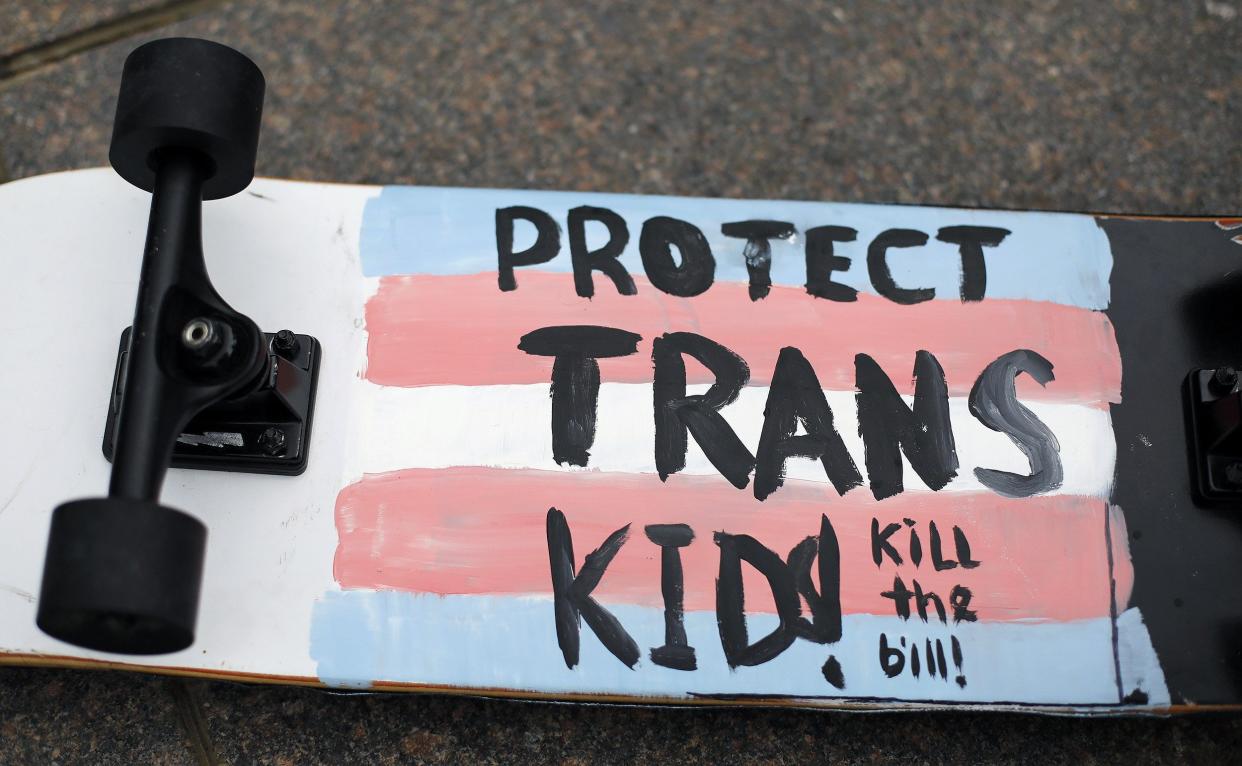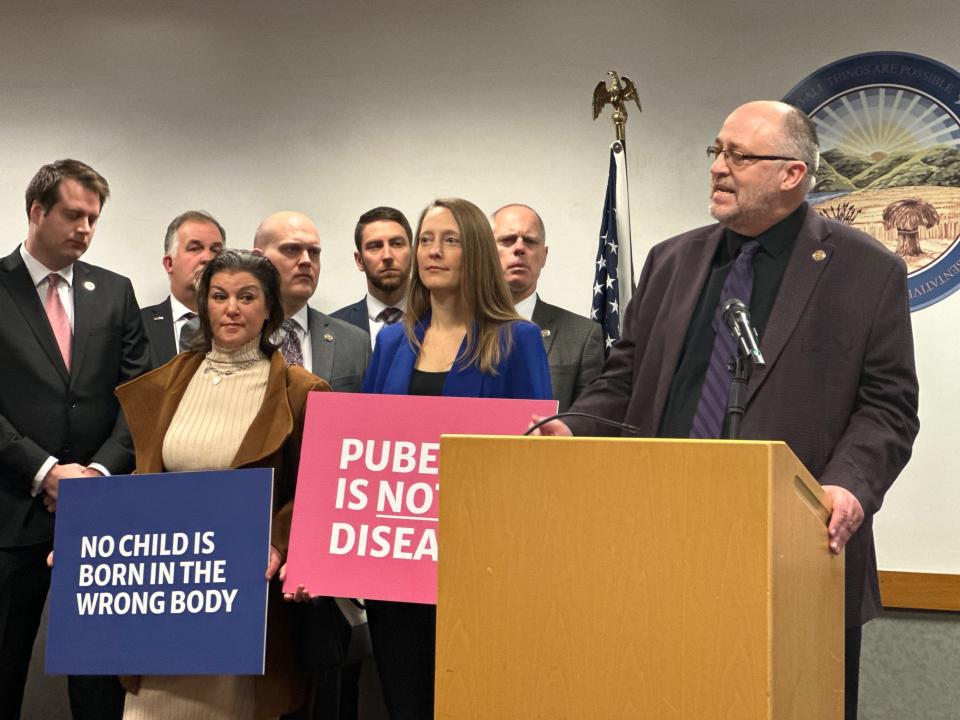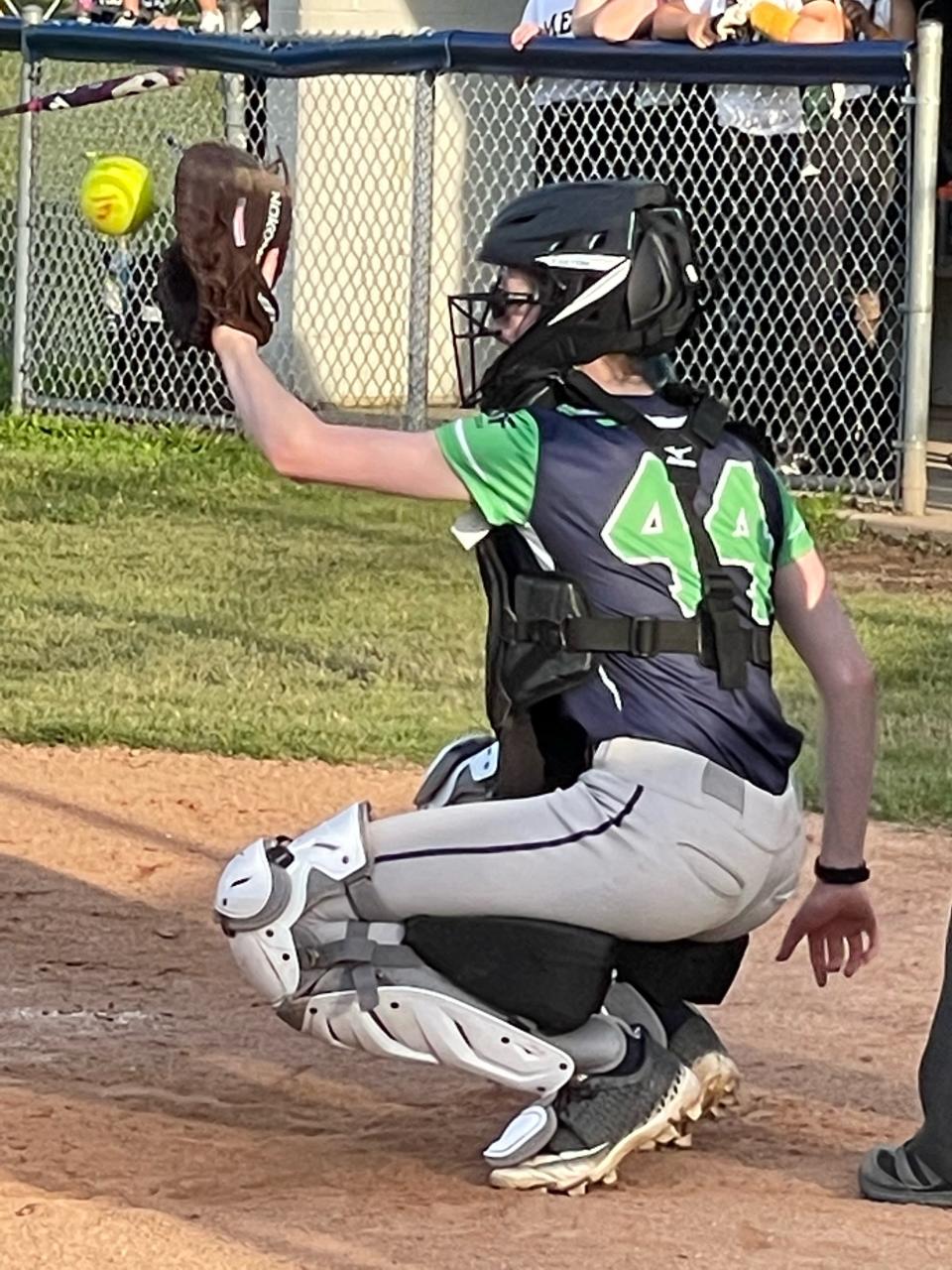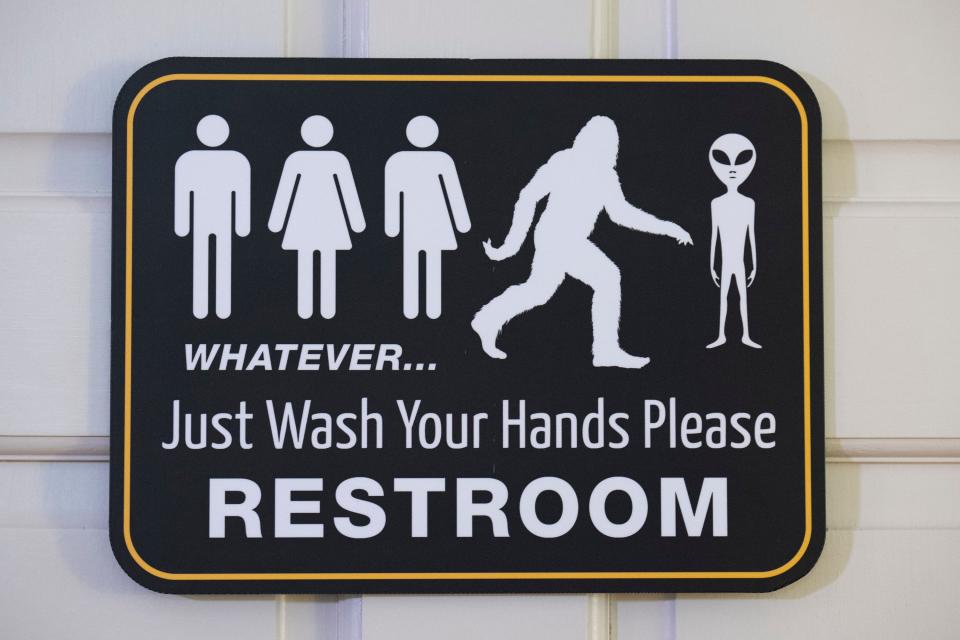'Discriminatory legislation': Five Ohio bills targeting transgender Ohioans

Bills that would restrict transgender people's rights are more likely to fail than make it into law, according to Human Rights Campaign data, yet Republican politicians across the nation continue to introduce them.
Anti-transgender legislation has been proposed nationally and at the state level since at least 2013, when the first “bathroom bill” was introduced in Arizona.
Despite its failure, the eventually withdrawn 2013 Arizona “bathroom bill” — which attempted to legally enforce that people use the bathroom of their sex assigned at birth — spurred many other bills of its kind across the nation, according to nonprofit library JSTOR.
On Transgender Awareness Day on Monday, there are currently five bills pending in the GOP-controlled Ohio General Assembly that would limit the rights of transgender people. Here's more information on the proposals, what they mean and where they are in the legislative process:
Ohio House Bill 8: 'Parents' Bill of Rights
Status: Passed by the Ohio House; in Senate Education Committee
What it is: The bill would "require public schools to adopt a policy on parental notification on student health and well-being and instructional materials with sexuality content."
What do LGBTQ organizations say? The bill could mean teachers and other school staff have to report a student's gender identity, or "out them," to their parents, according to Kaleidoscope Youth Center, a Columbus-based organization that supports LGBTQ youth and allies. Staff would be required to report other health services and information to parents, too, even if it could lead to abuse or neglect, according to Kaleidoscope.
The bill also allows parents to review any "sexuality content" to be taught to their children and request that alternative content be provided to their children.
“The risk of a child having to go home to an unsupportive home remains high," Bruno said in April.
"If the new language of HB 8 has the effect of prioritizing parents’ feelings over the well-being of children while putting the physical safety of kids at risk, we obviously have serious concerns. Kids are their own people, too, and they deserve safety and respect.”
What do bill sponsors say? Rep. D.J. Swearingen, R-Huron, said during sponsor testimony in March that the bill protects parents' ability to determine their child's mental and physical health.
"The bill sponsor believes that the parent has a right to know this information," Rep. Adam Bird, R-New Richmond, said in April. "Teachers should not have the right to withhold information from parents. That the parent is responsible for raising the child."
Ohio House Bill 68: 'SAFE Act'

Status: Passed by the Ohio House; in the Senate Government Oversight Committee
What it is: The Saving Adolescents from Experimentation (SAFE) Act is "regarding gender transition services for minors." The Save Women's Sports Act (House Bill 6) was an addition to it and would make it so schools must designate single-sex teams and sports, meaning transgender women and girls couldn't compete in K-12 or collegiate sports.
What do LGBTQ organizations say? The bill would ban "vital" gender-affirming care for transgender youth — such as the prescribing of hormones and puberty blockers and performing sex reassignment surgery — and prevent health care providers from helping their patients get that care in other states, according to Kaleidoscope Youth Center.
It would also keep mental healthcare providers from diagnosing, screening or treating a minor for gender-related conditions without parental consent, including screening for abuse and trauma. In addition, courts couldn't take into account a parent's lack of acceptance of a child's trans identity in custody cases, according to Kaleidoscope. Medicaid in Ohio would also not be able to cover gender transition services.
“Gender-affirming care is lifesaving care," Cole Campos, a Kaleidoscope community wellness provider, said in a prepared comment. "It's so important for young trans people to have access to competent and supportive care that uplifts their identity. It says, 'I see you, and you deserve a full, happy life being who you are. You belong here.'"
What do bill sponsors say? Rep. Gary Click, R-Vickery, the primary sponsor of House Bill 68 and a pastor, said in a July Dispatch article that such medical interventions are "simply experiments on Ohio's youth."
"Our only concern is for the physical safety and mental health of children that are incapable of providing informed consent," Vickery said. "There is no place for ideology or activism in this debate."
Ohio House Bill 6: 'Save Women's Sports Act'

Status: Voted out of the Ohio House Higher Education Committee; amended into House Bill 68, which passed the House and is in the Senate Government Oversight Committee
What it is: If passed, it would make it so schools must designate single-sex teams and sports, meaning transgender women and girls can't compete in K-12 or collegiate sports.
What do LGBTQ organizations say? Kaleidoscope calls the bill "discriminatory legislation" and points to Center for American Progress research that states that participating in sports can be lifesaving for LGBTQ youth, providing social, emotional and psychological benefits.
"All kids, including transgender and nonbinary youth, deserve the opportunity to participate in school sports to challenge themselves, improve fitness, and be part of a team," Bruno said in May.
What do bill sponsors say? Rep. Jena Powell, R-Arcanum, said that girls' opportunity to play and win by the rules in sports they love is being "ripped from them by biological males," according to a May Dispatch article. Powell tried unsuccessfully to pass the legislation multiple other times, including in 2021 and 2022.
More facts: The Ohio High School Athletic Association has approved 15 transgender girls for female teams since 2015 and three at the high school level out of about 400,000 student-athletes who play.
Ohio House Bill 245: Prohibits 'adult cabaret' in certain locations

Status: In the Ohio House Criminal Justice Committee
What it is: The bill would ban drag performances, called "adult cabaret performances" in bill text, from public spaces that allow children, including public parks, libraries, parades and more.
The bill expands the definition of adult cabaret performers from strippers and topless dancers to include "entertainers who exhibit a gender identity that is different from the performer's or entertainer's gender assigned at birth."
The change would restrict certain drag events to bars and other spaces where minors are prohibited. Drag performers could face charges by local prosecutors, who could determine their performances were obscene or harmful to juveniles.
What do LGBTQ organizations say? The bill is "directly targeting any transgender or gender nonconforming individual in the public eye," according to Kaleidoscope.
"You're talking about the potential for actual jail time," Gary Daniels, a lobbyist for the American Civil Liberties Union of Ohio, said in July. "Does this apply to someone walking down the street or waiting for a bus? I don’t read it that way. But it does beg the question of, let’s say you are walking as part of a gay pride parade. It can be said you are performing there."
Some opponents also say state obscenity laws already cover lawmakers' concerns.
What do bill sponsors say? Rep. Josh Williams, R-Sylvania, said it doesn't mean "all performances."
"A man dressed as a woman reading a book is constitutionally protected speech," he said in July. "But I’ve seen videos of performances here in the state of Ohio and across the nation that are improper to be done in the presence of minors."
Ohio House Bill 183: On single-sex bathroom access

Status: In the Ohio House Higher Education Committee
What it is: The bill would ban transgender students from using school bathrooms, locker rooms and overnight accommodations that are in line with their gender identity.
Single-use restrooms could still be used, and children under 10 and those with disabilities would still be able to be assisted by a family member.
What do LGBTQ organizations say? Kaleidoscope calls it a "discriminatory bill," and other LGBTQ advocates have said it would make bathrooms less safe for transgender youth.
Bruno told The Dispatch in May that providing access to single-use facilities isn't enough, as they can be staff restrooms that are hard for students to use.
"To suddenly make an issue of this, it’s hard not to see it as them jumping on the national bandwagon," said Bruno. "It's surveillance of public spaces. It’s surveillance of kids in public spaces.
What do bill sponsors say? Rep. Adam Bird, R-New Richmond, said he's heard from superintendents and schools.
"They’re truly distressed over feeling like they’re required to allow boys in the girls' restroom and vice versa. It feels like the time is right," he said in May.
Bird said it's been a problem for several years, and Ohio is "late to this" discussion.
Two pending bills that could expand LGBTQ people's rights
Two bills also pending in Ohio would benefit the LGBTQ community.
House Bill 220, now in the House Public Health Policy Committee, would prohibit conversion therapy for minors.
Another, known as the Ohio Fairness Act (Senate Bill 132), is in the state Senate Oversight Committee and, if passed, would ban discrimination against people on based on their sexual orientation, gender identity or gender expression.
Why does anti-trans legislation often fail?
In 2023, almost 200 laws nationwide that ban or limit access to gender-affirming health care, public restrooms, legal recognition, sports, and more were introduced, according to Equitas Health, a Columbus-based nonprofit health care provider. The laws continue to fuel anti-transgender hate and violence, according to Equitas.
In 2022, 315 anti-equality bills were introduced in state legislatures around the country, according to LGBTQ advocacy group the Human Rights Campaign. But just around 10%, or 29, were signed into law.
Since 2021 nationwide, there have been at least 800 anti-trans bills, according to Dara Adkison, board secretary of TransOhio, an advocacy organization. Of those, the organization said 121 of them have passed, 565 failed, and 120 are currently active —including those in Ohio.

"So while less bills pass than fail, for the people living in states where these despicable bills have passed, the effects are broad and devastating," Adkison said.
And the bills still get introduced, even if they've failed multiple times.
"We've seen an explosion of introductions of different bills," said Maria Bruno, policy director at Equality Ohio, a statewide LGBTQ advocacy group. "It does feel like they're throwing spaghetti at the wall to see what will stick, and trying to defeat them feels like whack-a-mole."
Once LGBTQ advocates have explained to the public about one anti-trans bill, another is introduced, Bruno said. She sees this as an intentional effort to spread advocates thin.
There is a well-funded network of organizations behind the proposed laws, Bruno said, and the reasons politicians keep introducing anti-trans bills include the fact that it's easier to spread misinformation and fear-monger when people aren't familiar with a topic. There's also the fact that, briefly, anti-trans rhetoric galvanized voters and was something politicians could use in their campaign, Bruno said.
'Culture wars' candidates fail: Central Ohio voters mostly rejected school board candidates endorsed by conservative groups
Still, candidates who attach themselves to anti-trans views as part of the "culture wars" aren't winning either, Bruno said. Earlier this month, most school board candidates endorsed by conservative groups that favor book bans and restricted instruction on race and gender lost their races.
This is perhaps because there is broad approval for transgender rights. A June 2022 poll from Pew Research found that 64% of people strongly favor protecting trans people from discrimination.
It's important for Ohioans to tell their lawmakers how they feel, Bruno said.
Oppression shouldn't be part of 'culture wars,' some say
The "unrelenting attacks on trans people in Ohio are exhausting," Adkison said, but nothing will make transgender people go away.
"We've always been here, and we always will be," Adkison said, adding that it's not necessary for people to understand or know transgender people, just to know that the fight for liberty is universal. "All Ohioans deserve bodily autonomy, the right to exist in public spaces, and the right to just live our lives and make our own choices."

The right to oppress others should not be a cultural value that gets discussed, they said.
"The pending anti-trans legislation is abhorrent and a direct affront to the right to liberty of all Ohioans," Adkison said.
dking@dispatch.com
@DanaeKing
This article originally appeared on The Columbus Dispatch: These five Ohio bills target the rights of transgender people

